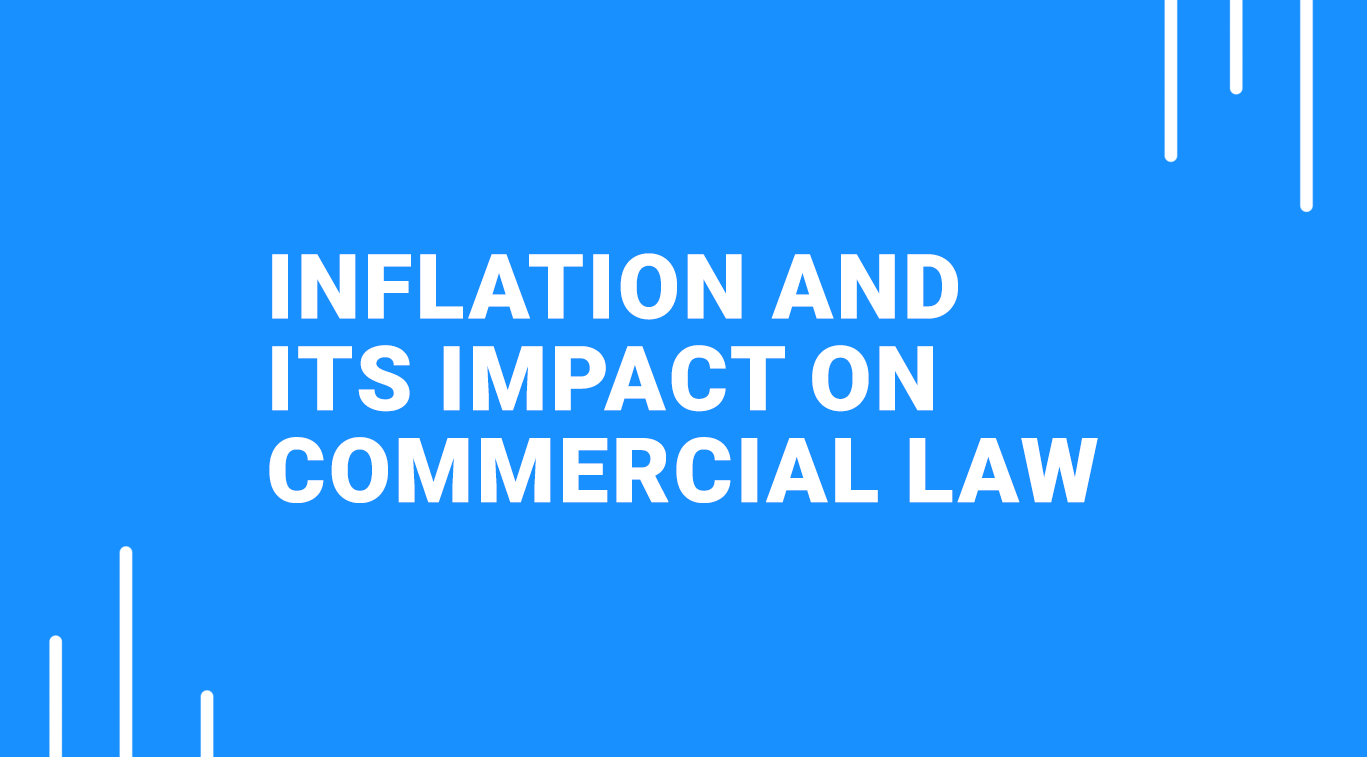Inflation and its Impact on Commercial Law
How price increases are being felt and reflected in commerce contracts

Written by Fatima Freifer
Blogger

Inflation in a nutshell
Inflation measures the rate at which the prices of goods and services have risen over time. Typically, people calculate inflation by comparing the cost of goods today to the cost of goods a year ago. The inflation rate is the average increase in prices. The Office for National Statistics is in charge of measuring inflation (ONS). Every month, the ONS publishes its measure of inflation, which shows how much prices have risen since the same date last year. This is referred to as the Consumer Price Index (CPI). [1]
The rise is primarily due to higher gas and fuel prices, as well as a global rise in the prices of manufactured goods. Excess demand in the domestic economy will ensure that these increased costs are passed on to consumers in the form of higher prices. However, it is assumed that they will only be partially offset by higher nominal wage growth. Real wages will eventually fall significantly. [2]
Following unprecedented levels of government stimulus to combat the coronavirus pandemic, there have been significant inflationary pressures around the world in recent months. In the case of the United Kingdom, in particular, the massive quantitative easing, low-interest rates, and assistance provided to help businesses and households cope with the pandemic have resulted in an increase in capital in the economy, driving up prices. In the United Kingdom, inflation rose faster than expected and exceeded the Bank of England’s target of 2%. [3]
The Impact on Commercial Contracts
In the absence of an express indexation right or other right to vary price, the current UK inflation rate means that suppliers face a 5% year-on-year reduction in their charges in real terms. [4] When faced with wage inflation and cost increases from their own suppliers, any supplier who is unable to pass those increases on to their customers is likely to see their contracts quickly become unprofitable and potentially unviable. Even the best commercial case management system requires due analytical diligence.
As a result, the impact will differ. The trend in IT contracts and legal software tools has been for shorter contracts with more flexible termination rights or charging provisions, which should soften the blow. However, after a decade of low and stable inflation, indexation has become an overlooked clause, and its omission in some long-term contracts may come back to the supplier. [5]
Fiscal Policy and Quantitative Easing
The UK government’s fiscal policy has resulted in inflation. In theory, quantitative easing can lead to inflationary pressures if too much money is created through the purchase of liquid assets. [6] This increase in money supply, combined with a decrease in purchasing power, has been driving recent price increases. Individuals have seen an increase in real disposable income as a result of the increased money supply, which has encouraged them to spend money they had saved during the lockdown. [7]
Cost changes including legal pricing analytics are often only visible to procurement teams at the time of contract renewal, and these contracts are typically retroactive and index-based, which means there is a significant risk of cost changes being missed in projections, for example incorporation of legal solutions software cost. As a result, private equity firms run the risk of overstating EBITDA (earnings before interest, taxes, depreciation, and amortisation) on acquisitions.
Businesses are implementing a variety of strategies to manage the risk of inflation. These include passing on prices to customers, implementing energy and freight surcharges, reengineering products (design to value), and forming partnerships with suppliers that go beyond price alone (e.g. joint innovation) to secure long-term relationships when some suppliers are deprioritizing customers or reneging on contracts. The ability to manage inflation risk, on the other hand, is ultimately determined by how well the problem is understood. [8]
While inflation may be regarded as a fleeting risk, it will not vanish in an instant. Globally, there are significant supply chain disruptions, with key port and factory closures among the factors contributing to higher input costs. In the United Kingdom, factory input and output costs are rising faster than CPI inflation. Supply chains are not expected to normalise until 2023, and many businesses may be underestimating the magnitude of what is to come in the next 12 to 24 months.
Relief under English Law
It is highly unlikely that a supplier will be exempt from the effects of inflation unless express provisions are made. The mere fact that inflation is causing hardship for the supplier or has rendered the contract unprofitable is insufficient.
Some contracts, legal technology and smart contracts or framework agreements expressly provide for price increases, requiring the relying party to provide sufficient evidence and justification in support of the requested price increase as a condition of acceptance or consideration at all. When the other party has the discretion to accept or refuse the request, there may be an implied restriction that that discretion be exercised rationally and in good faith, taking into account the purpose of the clause itself. Subject to the provision relied on and the type of contract, there may then be an additional implied restriction on reliance to the extent of reasonableness. [9]
A rise in inflation is highly unlikely to be a force majeure event. In English law, force majeure does not have a precise definition and instead has the meaning given to it by the parties. However, it is usually limited to obligations that are rendered impossible to fulfill, and economic hardship is usually insufficient.
Conclusion
Many contracts include clauses governing the procedure to be followed by the parties in the event of a dispute, which may include pricing disputes or reliance/interpretation of clauses, such as those mentioned above. This may impose obligations on the parties to engage in negotiations or dispute resolution in a good faith effort to resolve the subject of the dispute throughout the process and avoid proceedings, allowing the parties to present their case for and against a price increase or the mechanism and amount thereof. Bringing the contract to an end and making an offer for a new contract at the desired price may be a convenient way of forcing a price increase; however, this carries the risk of resupply from elsewhere on the termination of any exclusivity, as well as the question of whether the contract can be terminated at all. [10]
References
[1] UK inflation uncertainty makes life difficult for the Bank of England, March 2022, https://think.ing.com/articles/uk-inflation-uncertainty-makes-life-difficult-for-the-bank-of-england
[2] What is the UK’s inflation rate and why is the cost of living going up? April 2022, https://www.bbc.co.uk/news/business-12196322
[3] Inflation and the 2% target, https://www.bankofengland.co.uk/monetary-policy/inflation
[4] UK: Inflation is back – What does this mean for commercial contracts? 24 January 2022 Peter Church DigiLinks https://www.linklaters.com/en/insights/blogs/digilinks/2022/january/uk-inflation-is-back-what-does-this-mean-for-commercial-contracts
[5] Which inflation index should I refer to in a price variation clause? 10/03/2022 https://www.lexisnexis.co.uk/legal/guidance/which-inflation-index-should-i-refer-to-in-a-price-variation-clause
[6] State of the Legal Market analysis: How inflation’s return may mean 6% or more rate growth for law firms, Isaac Brooks Senior Analyst / Financial Insights / Thomson Reuters, 20 Jan 2022 https://www.thomsonreuters.com/en-us/posts/legal/state-of-the-legal-market-analysis-rates-and-inflation/
[7] Pricing law and guidance https://www.hants.gov.uk/business/tradingstandards/consumeradvice/goodsandservices/pricinglaw
[8] Scheduling Effective Client Meetings, Fatima Freifer, https://goodlawsoftware.co.uk/scheduling-effective-client-lawyer-meetings
[9] UK Legal Tech and IP Law, Fatima Freifer, https://goodlawsoftware.co.uk/uk-legal-tech-and-ip-law
[10]Virtual Legal Consultations, Fatima Freifer, https://goodlawsoftware.co.uk/virtual-legal-consultations-ethical-consideration








